Hiring the right CoffeeScript developer can be a challenging task for recruiters and hiring managers. The key lies in asking the right questions during the interview process to assess a candidate's technical skills, problem-solving abilities, and understanding of CoffeeScript's unique features.
This blog post provides a comprehensive list of CoffeeScript developer interview questions, categorized for different experience levels and areas of expertise. From general questions to syntax-specific inquiries and compilation process details, we've got you covered with a wide range of topics to help you evaluate potential candidates effectively.
By using these questions, you can gain valuable insights into a candidate's CoffeeScript proficiency and make informed hiring decisions. Additionally, considering a JavaScript online test before the interview can help you shortlist the most promising candidates efficiently.
Table of contents
5 general Coffeescript Developer interview questions and answers to assess candidates
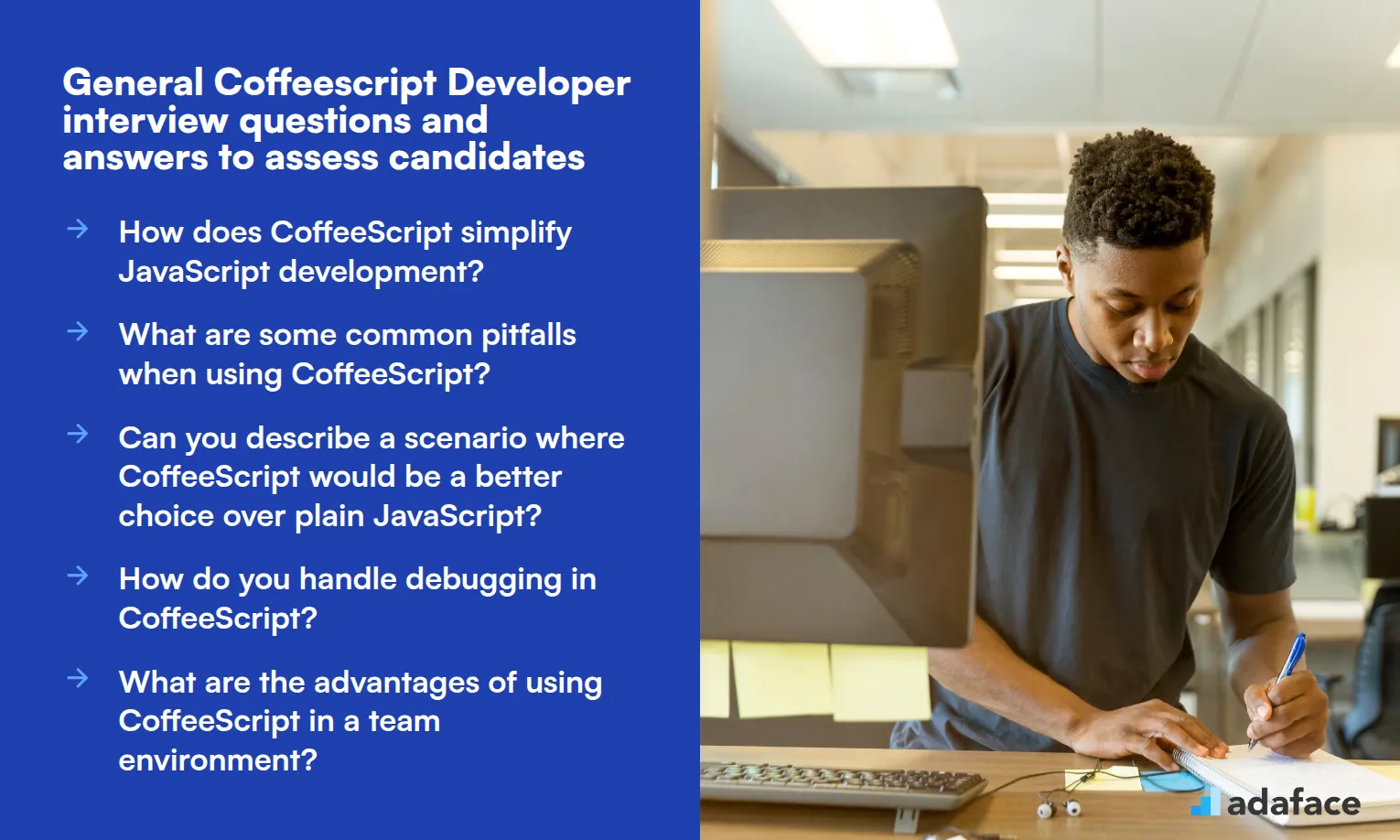
To help you navigate the caffeine-powered world of CoffeeScript development, we've brewed up a list of interview questions that you can use to assess candidates. These questions are designed to gauge both the technical know-how and the creative problem-solving abilities of your applicants, ensuring you find the right developer for your team.
1. How does CoffeeScript simplify JavaScript development?
CoffeeScript is like a friendly translator that makes JavaScript easier to write and read. It reduces the amount of code you need by introducing more concise syntax, which helps in maintaining cleaner codebases.
Candidates should emphasize the benefits of CoffeeScript, such as shorter code, improved readability, and how it eliminates JavaScript's quirks. This demonstrates their understanding of why it might be chosen for a project.
2. What are some common pitfalls when using CoffeeScript?
While CoffeeScript can make code cleaner, it can also introduce confusion if developers are not familiar with its syntax. One common issue is the automatic semicolon insertion, which can lead to unexpected results.
Look for candidates who can identify potential issues, such as compatibility problems with JavaScript or debugging challenges. A strong response will show awareness of both the advantages and limitations of CoffeeScript.
3. Can you describe a scenario where CoffeeScript would be a better choice over plain JavaScript?
CoffeeScript is a great choice for projects that value succinct code and where the team is familiar with its syntax. It's particularly useful in projects that require frequent refactoring or where code readability is a priority.
The ideal candidate should provide specific examples, such as front-end applications where rapid prototyping is essential, and explain how CoffeeScript can enhance development efficiency. This demonstrates their ability to evaluate the right tools for a project.
4. How do you handle debugging in CoffeeScript?
Debugging in CoffeeScript can be tricky due to its abstraction over JavaScript. Tools like source maps are essential, as they map CoffeeScript code to the JavaScript it compiles into, making it easier to trace errors.
Strong candidates will discuss their methods for debugging, such as using Chrome DevTools with source maps enabled, and how they approach problem-solving in a CoffeeScript environment. This shows their practical experience and resourcefulness.
5. What are the advantages of using CoffeeScript in a team environment?
In a team setting, CoffeeScript promotes consistency and readability, which can lead to better collaboration and faster onboarding for new developers. Its concise syntax reduces room for errors.
Candidates should highlight how CoffeeScript can streamline the development process and improve team efficiency. An ideal response would include examples of how it has been successfully used in past team projects to enhance productivity.
20 Coffeescript Developer interview questions to ask junior developers
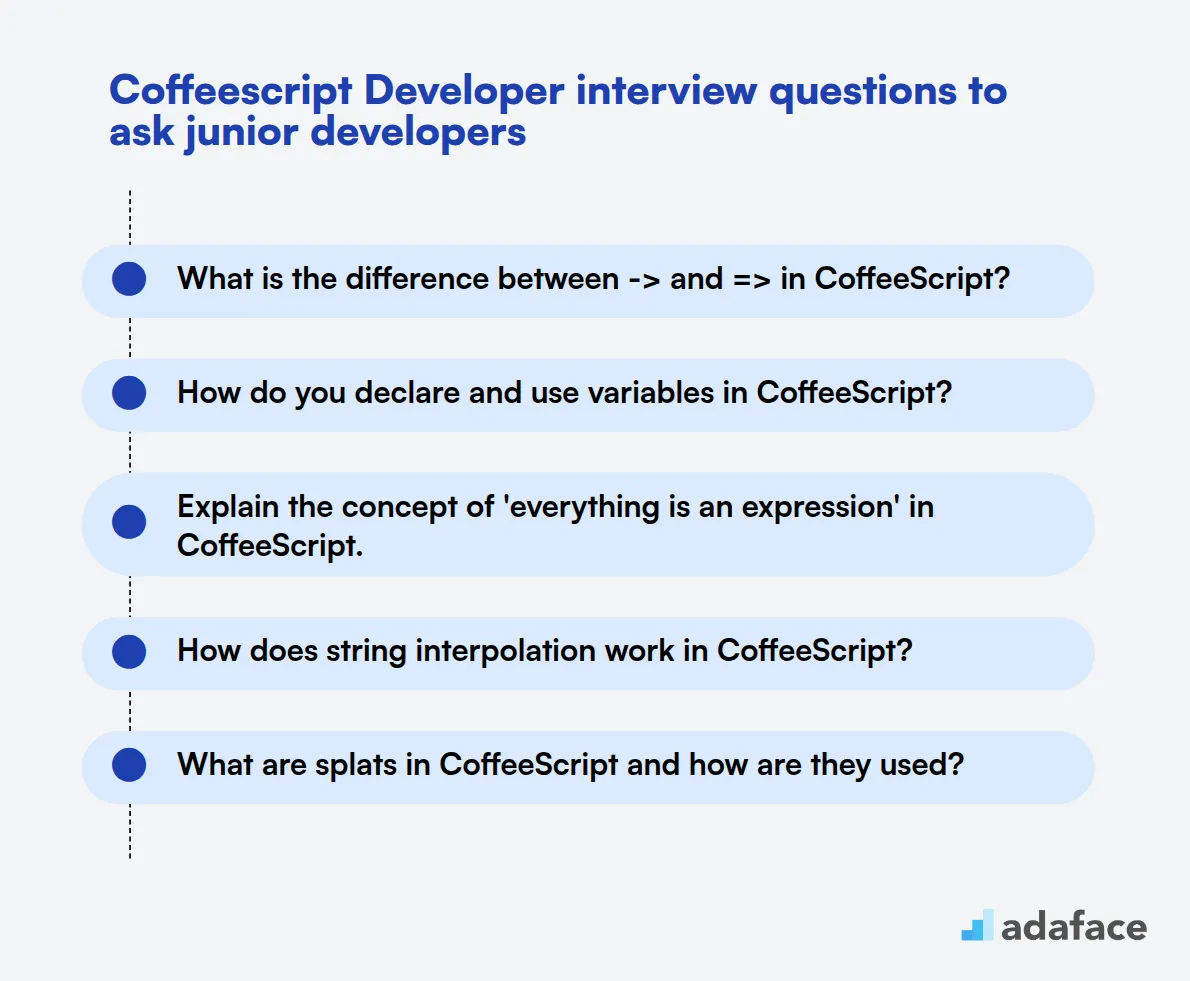
When interviewing junior developers for CoffeeScript positions, it's crucial to assess their foundational knowledge and problem-solving skills. The following questions will help you gauge a candidate's understanding of CoffeeScript basics, syntax, and common use cases. Use these questions to identify promising talent and ensure they have the essential skills to contribute to your team's projects.
- What is the difference between -> and => in CoffeeScript?
- How do you declare and use variables in CoffeeScript?
- Explain the concept of 'everything is an expression' in CoffeeScript.
- How does string interpolation work in CoffeeScript?
- What are splats in CoffeeScript and how are they used?
- How do you create a class in CoffeeScript?
- Explain the concept of destructuring assignment in CoffeeScript.
- How do you handle conditional statements in CoffeeScript?
- What is the purpose of the ? operator in CoffeeScript?
- How do you write a loop in CoffeeScript?
- Explain the difference between 'is' and '==' in CoffeeScript.
- How do you comment code in CoffeeScript?
- What is the purpose of the 'unless' statement in CoffeeScript?
- How do you define and use functions in CoffeeScript?
- Explain the concept of comprehensions in CoffeeScript.
- How do you handle exception handling in CoffeeScript?
- What is the significance of indentation in CoffeeScript?
- How do you work with objects and arrays in CoffeeScript?
- Explain the concept of 'fat arrow' functions in CoffeeScript.
- How do you use the 'extends' keyword in CoffeeScript?
7 Coffeescript Developer interview questions and answers related to syntax and best practices
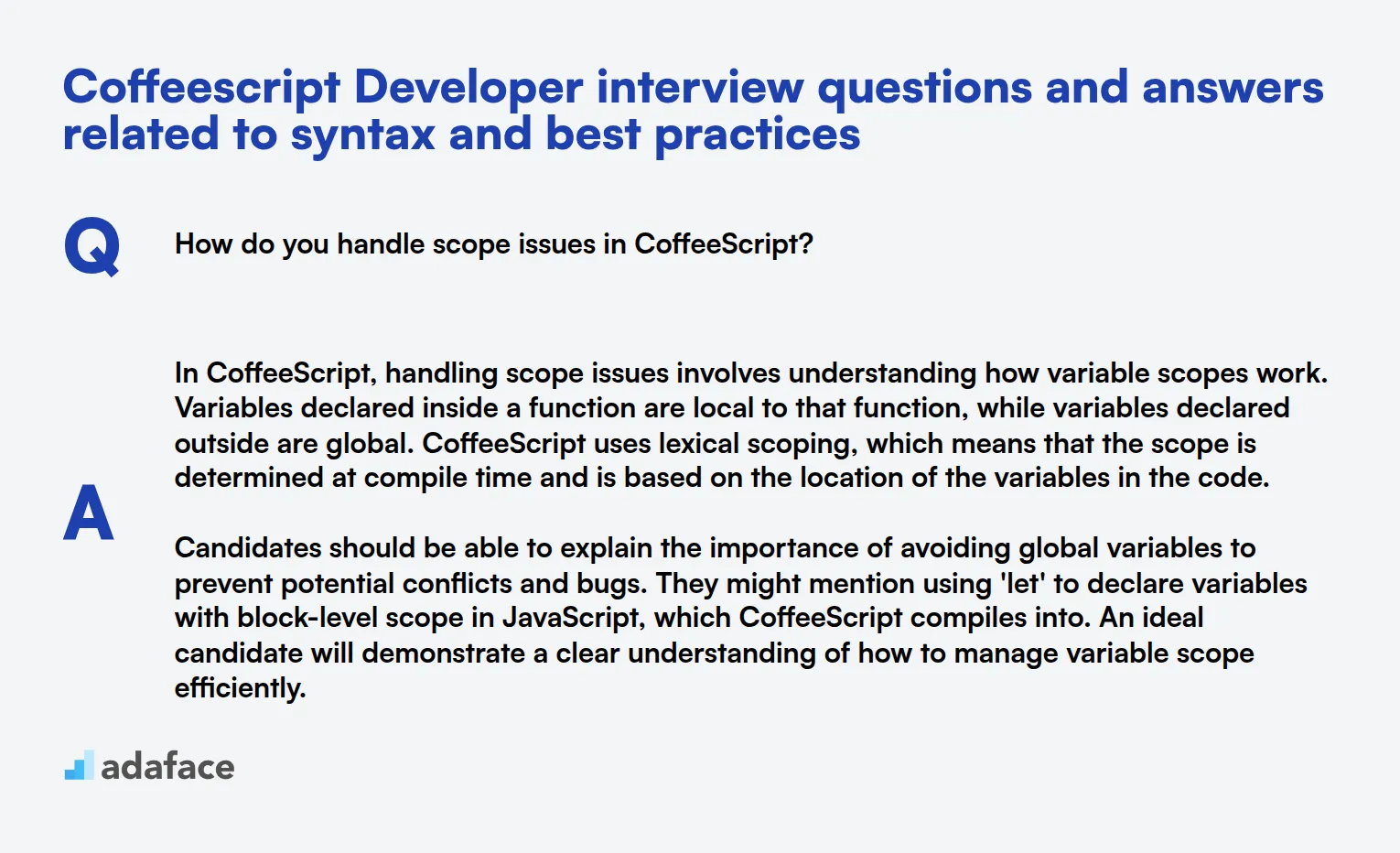
Are you ready to dive into the world of CoffeeScript with a splash of curiosity and a dash of expertise? This handpicked list of questions is designed to help you unravel the CoffeeScript conundrum and see if your candidate can brew the perfect code. Use these questions to assess applicants' understanding of the nuances and best practices of CoffeeScript, ensuring they have the skills to make your team percolate with success.
1. How do you handle scope issues in CoffeeScript?
In CoffeeScript, handling scope issues involves understanding how variable scopes work. Variables declared inside a function are local to that function, while variables declared outside are global. CoffeeScript uses lexical scoping, which means that the scope is determined at compile time and is based on the location of the variables in the code.
Candidates should be able to explain the importance of avoiding global variables to prevent potential conflicts and bugs. They might mention using 'let' to declare variables with block-level scope in JavaScript, which CoffeeScript compiles into. An ideal candidate will demonstrate a clear understanding of how to manage variable scope efficiently.
2. What are some best practices in organizing CoffeeScript projects?
Organizing a CoffeeScript project effectively is crucial for maintaining and scaling applications. Best practices include maintaining a clear directory structure, separating logic into different files, and using meaningful file names. This aids in project readability and manageability.
Candidates should also mention the importance of using source control systems like Git, and incorporating build tools such as Gulp or Webpack for automation tasks. An ideal response will highlight an understanding of how organized project structures can lead to more efficient development workflows.
3. Can you explain how CoffeeScript handles asynchronous operations?
CoffeeScript handles asynchronous operations by compiling into JavaScript, which employs callbacks, promises, or async/await for managing async code. CoffeeScript itself doesn't add new async behavior but makes writing JavaScript easier and more concise.
Candidates should demonstrate familiarity with JavaScript's asynchronous patterns and how CoffeeScript can be used to streamline the syntax. Look for responses indicating an ability to manage async operations effectively, ensuring smooth task execution without blocking the main thread.
4. How does CoffeeScript encourage writing clean and maintainable code?
CoffeeScript encourages clean and maintainable code through its syntax, which eliminates unnecessary punctuation and enforces indentation. This makes the code more readable and reduces the likelihood of errors.
Candidates should highlight how CoffeeScript's design encourages developers to focus on the logic rather than the syntax. They may also mention how CoffeeScript’s concise syntax can lead to fewer lines of code, making maintenance easier. An ideal candidate will appreciate the balance between simplicity and functionality in CoffeeScript.
5. How do you manage dependencies in a CoffeeScript project?
Managing dependencies in a CoffeeScript project typically involves using package managers like npm or yarn. These tools allow developers to install, update, and manage external libraries and frameworks necessary for the project.
Candidates should mention the importance of maintaining an updated package.json file and understanding semantic versioning to avoid compatibility issues. A proficient candidate will demonstrate experience with dependency management tools and the ability to resolve conflicts effectively.
6. How does CoffeeScript handle error handling compared to JavaScript?
CoffeeScript compiles directly to JavaScript, so it inherits JavaScript's error handling mechanisms, such as try-catch blocks. CoffeeScript's syntax, however, can make these constructs more concise and readable.
Candidates should be able to discuss how CoffeeScript’s streamlined syntax does not alter functionality but rather simplifies the writing of error handling code. An ideal response will reflect an understanding of JavaScript’s error handling techniques and how CoffeeScript can be used to write cleaner error management code.
7. How do you ensure compatibility of CoffeeScript with existing JavaScript libraries?
Ensuring compatibility of CoffeeScript with existing JavaScript libraries involves understanding that CoffeeScript compiles to JavaScript, which means it can interoperate with JavaScript libraries seamlessly. Developers should be aware of potential issues such as naming conflicts or global variable usage.
Candidates should mention testing and debugging to ensure smooth integration and may discuss tools and practices that facilitate compatibility. Ideal candidates will show awareness of the potential pitfalls and strategies for ensuring CoffeeScript and JavaScript libraries work harmoniously.
10 Coffeescript Developer questions related to compilation process
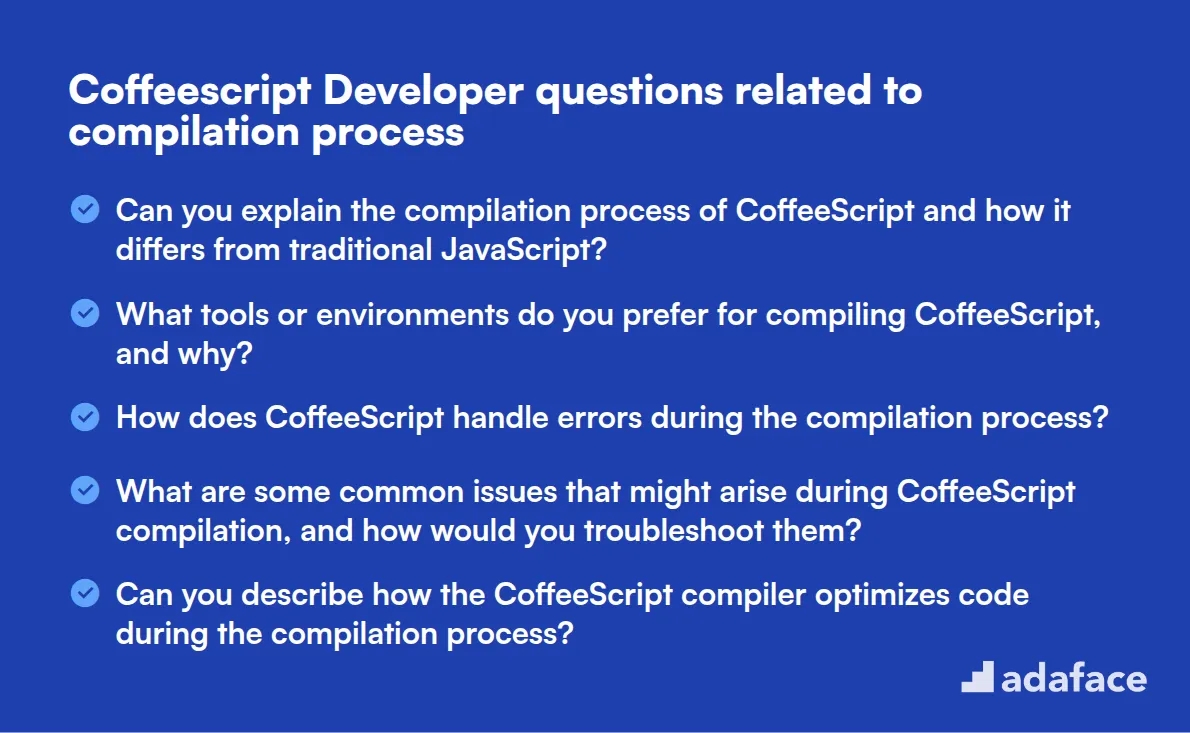
To assess a candidate's knowledge of the CoffeeScript compilation process, consider asking these targeted questions. This list can help you gauge their understanding of how CoffeeScript translates into JavaScript and the nuances of the compilation workflow, ensuring they’re well-equipped for the role. For additional insights on required skills, you may explore the CoffeeScript developer job description.
- Can you explain the compilation process of CoffeeScript and how it differs from traditional JavaScript?
- What tools or environments do you prefer for compiling CoffeeScript, and why?
- How does CoffeeScript handle errors during the compilation process?
- What are some common issues that might arise during CoffeeScript compilation, and how would you troubleshoot them?
- Can you describe how the CoffeeScript compiler optimizes code during the compilation process?
- How would you integrate CoffeeScript compilation into a continuous integration/continuous deployment (CI/CD) pipeline?
- What is the role of source maps in the CoffeeScript compilation process?
- How do you ensure that the compiled JavaScript maintains performance and readability?
- Can you explain how to use the CoffeeScript command line for compiling files?
- What strategies would you use to manage different versions of CoffeeScript in a project?
Which Coffeescript Developer skills should you evaluate during the interview phase?
While a single interview cannot provide a complete picture of a candidate's capabilities, there are certain core skills essential for a CoffeeScript Developer. Focusing on these key areas can help you better assess a candidate's qualifications and fit for your team.
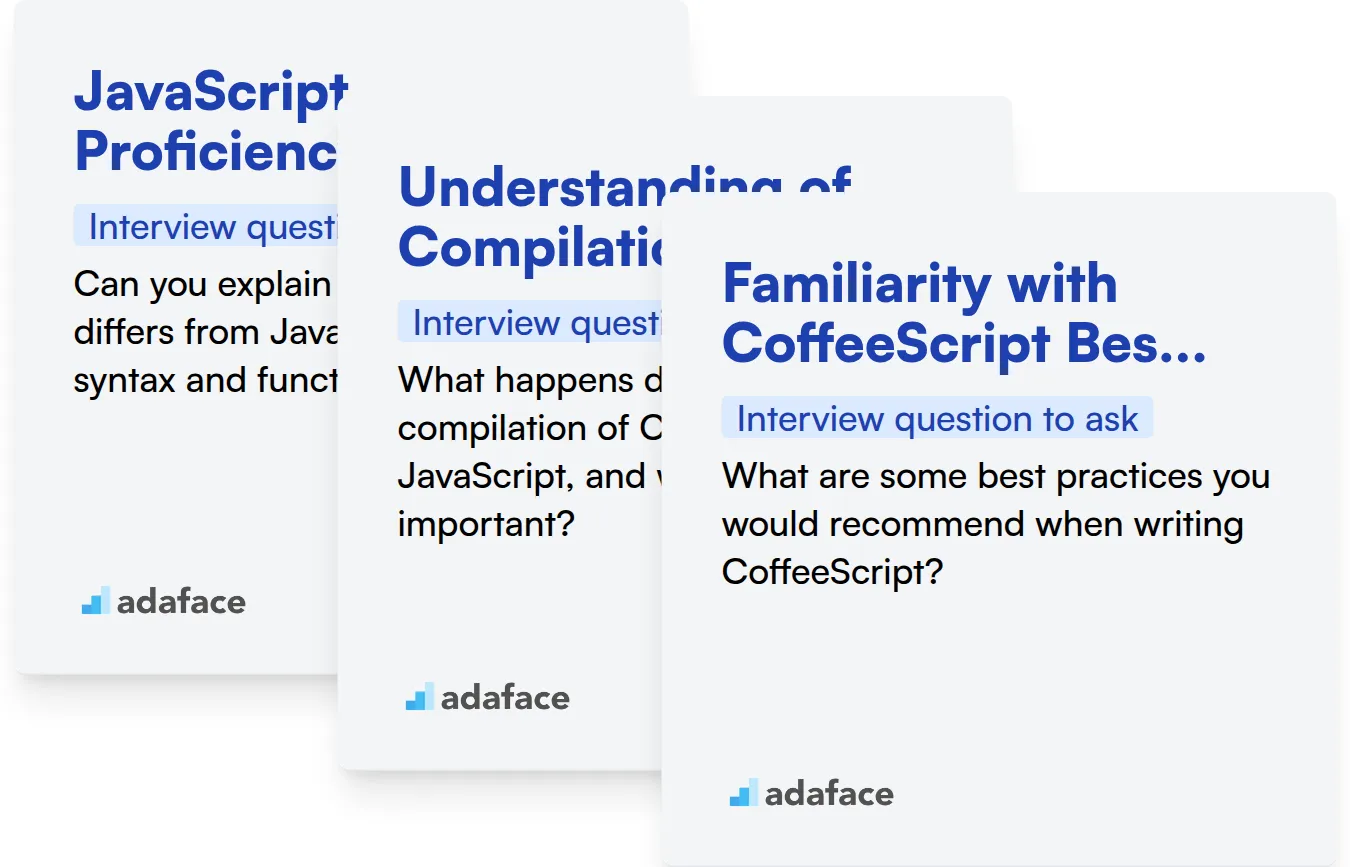
JavaScript Proficiency
To filter candidates based on their JavaScript knowledge, consider using an assessment test that includes relevant multiple-choice questions. For evaluating JavaScript skills, you might want to explore the JavaScript assessment test in our library.
You can also ask targeted interview questions to evaluate their JavaScript proficiency further.
Can you explain how CoffeeScript differs from JavaScript in terms of syntax and functionality?
When asking this question, look for clarity in their explanation and an understanding of key differences, such as indentation-based syntax, function binding, and the ability to write more concise code. Their response should reveal not just knowledge of CoffeeScript, but also a solid grasp of JavaScript fundamentals.
Understanding of Compilation Process
Use an MCQ-based assessment test focused on the compilation process to evaluate this skill. Our library may offer a suitable test to help gauge a candidate's expertise in understanding the compilation intricacies.
Another effective approach is to ask specific questions about the compilation process during the interview.
What happens during the compilation of CoffeeScript to JavaScript, and why is this important?
Look for responses that cover the steps of compilation and the benefits it provides, such as cleaner code and fewer bugs in the final output. Candidates should demonstrate a clear understanding of what the compilation entails.
Familiarity with CoffeeScript Best Practices
To assess this skill, consider implementing an MCQ-based test that focuses on CoffeeScript best practices. While we currently do not have a specific test dedicated to this skill, incorporating general programming best practices can also be useful.
Consider posing targeted questions that explore their familiarity with CoffeeScript best practices.
What are some best practices you would recommend when writing CoffeeScript?
When candidates answer, look for insights on code organization, naming conventions, and the importance of avoiding unnecessary complexity. Their ability to articulate best practices will reflect their experience and understanding of the language.
3 Tips for Using Coffeescript Developer Interview Questions
Here are our tips before you start putting what you've learned to use.
1. Incorporate Skill Tests Before Interviews
Using skill tests before interviews helps filter candidates effectively. This approach ensures that only those with genuine expertise move forward in the hiring process.
Consider using tests like the JavaScript Online Test or the TypeScript Online Test as they align well with Coffeescript's scripting nature.
By implementing these tests early, you gain insights into a candidate's real-world capabilities. Transitioning smoothly to the next step, consider compiling your interview questions carefully.
2. Compile a Focused Set of Interview Questions
Time constraints require you to select a limited number of questions. Choose questions that assess relevant skills effectively.
Expand your question set by considering related topics, such as JavaScript interview questions. These can offer insights into a candidate’s broader technical abilities.
Remember, asking focused questions maximizes your efficiency and enhances candidate assessment.
3. Ask Follow-Up Questions
Initial questions may not always reveal a candidate's full potential. Follow-up questions help uncover depth and genuine understanding.
For example, ask a candidate about their experience with async functions in Coffeescript. Follow up by asking how they handle callbacks. This follow-up checks their depth of knowledge and problem-solving skills.
Use CoffeeScript interview questions and skills tests to hire talented CoffeeScript Developers
If you are looking to hire someone with CoffeeScript skills, it is important to ensure they possess those skills accurately. The best way to do this is by using skill tests, such as our CoffeeScript assessment.
After utilizing this test, you can effectively shortlist the best applicants and invite them for interviews. To get started, visit our test library to explore relevant assessments.
TypeScript Online Test
Download Coffeescript Developer interview questions template in multiple formats
Coffeescript Developer Interview Questions FAQs
CoffeeScript is a language that compiles into JavaScript, offering a cleaner syntax and aiming to improve readability.
Look for proficiency in JavaScript, understanding of CoffeeScript syntax, and experience with the compilation process.
CoffeeScript simplifies JavaScript by removing unnecessary syntax and providing more readable and concise code.
Challenges include finding candidates with both CoffeeScript expertise and a strong JavaScript background.
While less popular today, CoffeeScript remains relevant for projects that value its syntax for code readability.
By allowing developers to write more concise code, CoffeeScript can speed up the development process and reduce errors.

40 min skill tests.
No trick questions.
Accurate shortlisting.
We make it easy for you to find the best candidates in your pipeline with a 40 min skills test.
Try for freeRelated posts
Free resources




